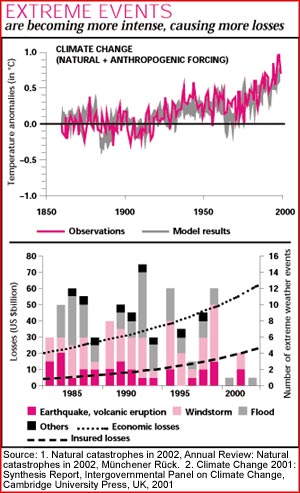Climate has changed
 a tiny kingdom of subsistence farmers in Africa is hungrier than ever. In January 2003, rainfall patterns of Lesotho altered suddenly, ushering in untimely frost and severe storms that destroyed most of the standing crops. “Frost in the summertime! We never used to see weather like this. We don’t know what to expect anymore from the skies. I think God is angry with us, but I don’t know why,” says Makhabasha Ntaote, a 70-year-old matriarch.
a tiny kingdom of subsistence farmers in Africa is hungrier than ever. In January 2003, rainfall patterns of Lesotho altered suddenly, ushering in untimely frost and severe storms that destroyed most of the standing crops. “Frost in the summertime! We never used to see weather like this. We don’t know what to expect anymore from the skies. I think God is angry with us, but I don’t know why,” says Makhabasha Ntaote, a 70-year-old matriarch.
Scientists have a possible answer to Ntaote’s question. They predict that nearly a third of Lesotho’s 2.1 million residents will soon require aid, as the mainstay of their economy suffers the impacts of global warming. According to the World Meteorological Organization (wmo), this year the impacts would be more apparent than ever before worldwide in the form of extreme weather events.
The specialised climate science agency of the United Nations normally confines itself to issuing scientific reports and statistics at the end of each year. However, the extreme oddities of weather patterns this year compelled the organisation to issue a warning recently. Already, a pre-monsoon heat wave in India has resulted in temperatures over 45
Related Content
- Reply filed by the state of Odisha regarding increasing instances of high energy swell waves, May 1, 2025
- Status report by Department of Environment, GNCTD on environmental clearance to mining projects in Delhi, 29/04/2025
- Reply by the Central Pollution Control Board (CPCB) regarding use of environmental compensation funds, 29/04/2025
- Affidavit on behalf of Union Territory of Puducherry on forest cover, 25/04/2025
- Colliding Crises: How the climate crisis fuels gender-based violence
- Affidavit filed by the MoEF&CC related to reduction of glacier sizes leading to an increase in moraine-dammed lakes in Himachal Pradesh and Tibet, 22/04/2025
